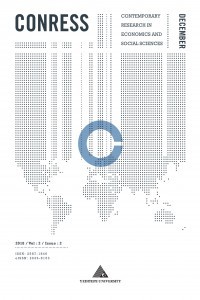Bağımsız Denetimde Mesleki Yargı Kullanımına Etki Eden Faktörler: Türkiye Örneği
Hızla değişen dünyada, muhasebe sürecinde olduğu gibi bağımsız denetim sürecinde de yeni çıkan konular ve standartlar doğrultusunda finansal raporlamanın özünü de oluşturan farklı düzeylerde mesleki yargı kullanım gerekliliği, bağımsız denetçiler için de önemli konuların başında gelmektedir. Bu çalışmada, Türkiye’de bağımsız denetimde mesleki yargı kullanımına yönelik bağımsız denetçilerin görüşleri belirlenmeye çalışılmıştır. Bağımsız denetçilerin tecrübeleri ve konu ile ilgili bireysel görüşleri önemli olduğu için, bu çalışmada nitel araştırma yöntemi kullanılmıştır.
Anahtar Kelimeler:
bağımsız denetim, bağımsız denetçi, mesleki yargı, denetçi yargısı, Türkiye
The Factors Affecting Using Professional Judgment in Independent Auditing: Evidences from Turkey
Using professional judgment, which constitutes the essence of financial reporting in accordance with newly released issues in the audit process at different levels, is one of the leading important issues for independent auditors as well as accounting process in the rapidly changing world. In this study, the opinions related to the factors affecting using professional judgment in independent auditing in Turkey have been determined. Due to importance of experiences and individual opinions of independent auditors, qualitative research method has been used in this study.
Keywords:
independent auditor, professional judgment, independent auditing, auditor's judgment, Turkey,
___
- Aghazadeh, S. (2012). Expressed confidence and skepticism: The effect of expressed confidence on auditor judgments (doctoral dissertation). The University of Oklahoma, Oklahoma.
- Bhattacharjee, S., & Moreno, K. K. (2013). The role of auditors’ emotions and moods on audit judgment: A research summary with suggested practice implications. Current Issues in Auditing, 7(2), 1–8.
- Bik, O. P. G. (2010). The behavior of assurance professionals: A cross-cultural perspective. Delft: Eburon Academic Publishers.
- Bonner, S. E. (1999). Judgment and decision-making research in accounting. Accounting Horizons, 13(4), 385–398.
- Chiang, H.-T., & Lin, S.-L. (2012). Effect of auditor’s judgment and specialization on their differential opinion between semiannual and annual financial reports. Global Journal of Business Research, 6(4), 1–22.
- Cianci, A. M., & Bierstaker, J. L. (2009). The impact of positive and negative mood on the hypothesis generation and ethical judgments of auditors. Auditing: A Journal of Practice & Theory, 28(2), 119–144.
- Danescu, T., & Chira, A. (2014). Professional Judgment and Reticence to Apply Sampling Techniques. Procedia Economics and Finance, 15, 1253–1258.
- Erturan, İ. E. (2007). Influence of culture on auditor and audit process: A study on auditors on Turkey (doctoral dissertation). Anadolu University, Eskişehir.
- Figueroa, C. R., & Cardona, R. J. C. (2013). Does Experience Affect Auditors’ Professional Judgement? Internal Controls and Fraud Decisions. In Global Conference on Business & Finance Proceedings (Vol. 8, pp. 221–222). Institute for Business & Finance Research.
- IAASB, ICAS, & IAAER. (2015). Research Finding Opportunity. Retrieved February 26, 2016, from http://files.iaaer.org/news/2015_IAASB_ICAS_IAAER_Research.pdf?1427121305
- IFAC. (2010). ISA 200, Overall Objective of the Independent Auditor, and the Conduct of an Audit in Accordance with International Standards on Auditing. Retrieved April 16, 2018, from http://www.ifac.org/system/files/downloads/a008-2010-iaasb-handbook-isa-200.pdf
- Kahneman, D., & Tversky, A. (1982). Subjective probability: A judgment of representativeness. In D. Kahreman, P. Slovic, & A. Tversky (Eds.), Judgment under Uncertainty: Herustics and Biases (pp. 32–47). Cambridge: Cambridge University Press.
- Lehmann, C. M., & Norman, C. S. (2006). The effects of experience on complex problem representation and judgment in auditing: An experimental investigation. Behavioral Research in Accounting, 18(1), 65–83.
- Messier Jr, W. F., Quilliam, W. C., Hirst, D. E., & Craig, D. (1992). The effect of accountability on judgment: Development of hypotheses for auditing; discussions; reply. Auditing: A Journal of Practice & Theory, 11, 123–138.
- Nolder, C. J. (2012). The Role of Professional Skepticism, Attitudes and Emotions on Auditor’s Judgments (doctoral dissertation). Bentley University, Ann Arbor, United States.
- Peytcheva, M., & Gillett, P. R. (2011). How partners’ views influence auditor judgment. Auditing: A Journal of Practice & Theory, 30(4), 285–301.
- Rutter, L., & Brown, K. (2015). Critical thinking and professional judgement for social work (4th ed.). Los Angeles: Sage/Learning Matters.
- Schmutte, J., & Duncan, J. R. (2009). Professional judgment: a model for accounting and auditing decisions. The CPA Journal, 79(9), 32–35.
- Socol, A. (2008). Materality in the Context of an Audit Between Professional Judgment and Subjectivism. Annals of the University of Petrosani Economics, 8(2), 209–216.
- Tanç, A., & Gümrah, A. (2015). A Survey to Determine Factors Affecting Professional Judgment Ability on Independent Audit. World of Accounting Science, 17(3), 522–538.
- The Canadian Institute of Chartered Accountants. (1995). Professional Judgment and the Auditor. Toronto: Canadian Institute of Chartered Accountants.
- The Institute of Chartered Accountants of Scotland. (2012). A professional judgement framework for financial reporting an international guide for preparers, auditors, regulators and standard setters. Edinburgh: ICAS. Retrieved from https://www.ifac.org/system/files/uploads/PAODC/A-Professional-Judgement-Framework-for-Financial-Reporting.pdf
- Trotman, K. T. (2006). Professional Judgement: Are Auditors Being Held to a Higher Standard Than Other Professionals? Sydney: Institute of Chartered Accountants in Australia.
- Wang, K. J., & Tuttle, B. M. (2009). The impact of auditor rotation on auditor–client negotiation. Accounting, Organizations and Society, 34(2), 222–243.
- Wittayapoom, K. (2014). Professional Judgment Effectiveness: A Study Of Tax Auditors In Thailand. In Global Conference On Business & Finance Proceedings (Vol. 9, pp. 585–593). Institute for Business & Finance Research.
- ISSN: 2587-1846
- Başlangıç: 2017
- Yayıncı: Yeditepe Üniversitesi
Sayıdaki Diğer Makaleler
Enerji Bağımlılığı ve Ekonomik Büyüme
Türk Siyasetinde Ordu ve 15-16 Temmuz Darbe Girişimi
Osmanlı ve Rus İmparatorluklarında Doğrudan Yabancı Yatırımlar
V. Necla GEYİKDAĞI, M. Yaşar GEYİKDAĞI
Türkiye’de Suriyeli Mültecilere Karşı Kamusal Tutumların Neden ve Sonuçları
Kimlik ve Kadın: İran İslam Cumhuriyeti Anayasası’nda Kadının Statüsü
Bağımsız Denetimde Mesleki Yargı Kullanımına Etki Eden Faktörler: Türkiye Örneği
